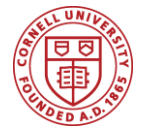
Master of Architecture (Professional)
Cornell University, Ithaca


Cornell University, Ithaca

Master of Architecture (Professional)
Cornell University, Ithaca
It is a top-ranked institution verified by QS
Degree
Postgraduate
Duration
42
Course Type
With Co-op
Co-op education gives you real-world experience in a job related to your studies.
INR
54.23L
USD 63798
1st Year Tuition Fees
Opening Soon
Opening Soon
USD 105